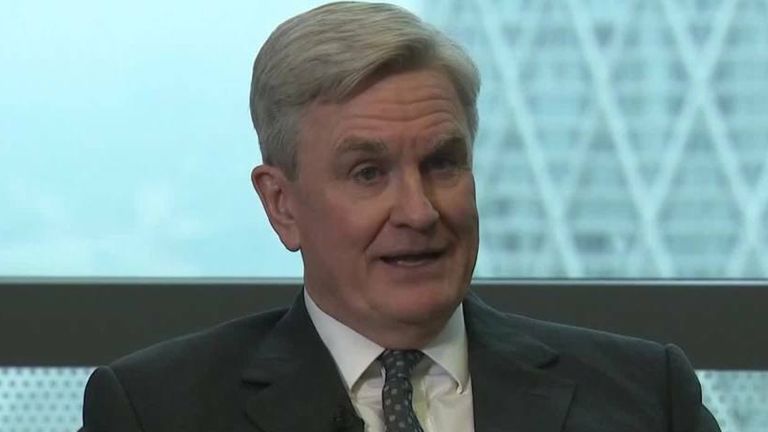Big vote of confidence in the City of London as Citi dismisses Brexit threat
They are the twin questions with which City executives have been grappling for some time.
The first concerns the extent to which Brexit might reduce London’s influence and status as a global financial services centre.
The second, raised during the pandemic, concerns the extent to which employees in the financial services sector will want to return to the office once life returns to normal.
Wednesday morning saw Citi, one of the world’s biggest banks, give its answers to those questions.
In an emphatic vote of confidence in both London as a financial centre and in the future of office working, the Wall Street giant – which employs 9,000 people in the capital and a further 3,200 in Belfast – announced a major refurbishment of its headquarters in Canary Wharf.
The amount it is spending has not been disclosed but is expected to run into nine figures.
The lender bought the 200-metre high, 42-storey tower at 25 Canada Square in Canary Wharf for £1.2bn in 2019 which, at the time, it said was a demonstration of its commitment to London as its headquarters for Europe, the Middle East and Africa (EMEA).
David Livingstone, Citi’s EMEA chief executive, told Sky News the latest investment underlined the bank’s confidence that London would remain one of the world’s preeminent international financial centres.
He said: “There are some background elements which never go away. London’s time zone position between Asia and the Americas.
“The rule of law, as well as English law, which is a very important component to international commerce.
“But there’s also the regulatory environment which is remains a strong principles-based environment which we think, post-Brexit, will forge its own particular way which will be positive for the UK.
“But the thing you can’t get away from is the talent – and it’s the talent which is home-grown, it’s the talent that wants to come to work in London, and we only see that as being a continuing element of why London is such a fantastic place to build not just a major operation, but also our headquarters for the entire region.”
Mr Livingstone said Citi had not had difficulties, since the UK left the EU, in trying to persuade people from continental Europe to work in London or in overcoming tougher restrictions around migration and work permits.
He added: “It’s a good question and one that we ask – and have been asked by the UK authorities – what can we do to make sure that those processes are as smooth as possible?
“But no, we haven’t seen a major deterioration in our ability to move people from the UK, to the EU, or in the other way.”
Mr Livingstone, who took charge of Citi’s EMEA operations in February 2019, said the bank had only moved a few hundred roles to Europe following Brexit but stressed Citi was currently increasing its UK headcount.
He added: “There have been some roles which have moved, but it’s been more that we have grown new roles in Paris, in Frankfurt, in Dublin as part of building the capabilities in our European operations that we need.”
As important to Mr Livingstone, who worked in mergers and acquisitions for Goldman Sachs, HSBC and Credit Suisse in Sydney, Singapore and New York as well as London before joining Citi, are the sustainability credentials of the refurbishment.
The entire tower will be gutted, requiring Citi’s employees to temporarily relocate to neighbouring offices in Canary Wharf, so that it can be refitted both to the latest environmental standards and in a way that incorporates changing working practices.
Refurbishing rather than demolishing the 21-year old tower, which is the UK’s 11th-tallest building, will avoid the release of some 100,000 tonnes of embedded carbon – the equivalent of running 21,739 family cars for a year.
The new tower will consume substantially less energy and water and is envisaged as being zero carbon.
Mr Livingstone said the refurbishment would involve the creation of more shared spaces where colleagues could come together and would also include flexible working areas – employees are thought unlikely to want to work in the office for five days a week in future – and well-being zones.
He added: “We’re a business of energy and ideas and we thrive on bringing people physically together.”
Citi’s vote of confidence in London can be seen in the broader context of what the bank is doing at group level.
Under its Scottish-born chief executive, Jane Fraser, Citi has been streamlining its operations around the world and particularly in the field of consumer banking. Last week it said it would exit consumer banking in Mexico and recently announced the sale of its retail operations in Indonesia, Malaysia, Vietnam and Thailand, having five months ago sold its retail banking operations in Mr Livingstone’s native Australia for A$1.2bn (£637m) to National Australia Bank.
It followed this just before Christmas with the sale of its consumer banking arm in the Philippines to local lender UnionBank for PHP45.3bn (£673m).
As Citi retrenches from consumer banking operations, the aim is to free up capital that can be deployed in other areas, such as wealth management and in wholesale banking. That would appear to place greater emphasis on Citi’s EMEA operations, which were already largely focused on those activities.
Mr Livingstone said: “Primarily in the Europe, Middle East Africa region, we were already [focused on] wholesale activities, so our markets, our banking, our treasury trade services, private banking, and so on, so that was the predominant mix of our activities and footprint.
“We’re happy with the choices that we’re making with regard to the to the strategy. One of the important components that we have increased is our presence in wealth, and wealth management generally – that’s an area that we…are very focused on here.”
Citi is the latest Wall Street banking giant to announce ambitious office plans in London.
JP Morgan kicked things off when, in 2012, it spent £495m on the former Lehman Brothers European headquarters at 25 Bank Street in Canary Wharf.
Then, in 2019, Goldman Sachs completed its new £1.1bn home in Plumtree Court, in Farringdon, as it relocated from its two former sites on nearby Fleet Street.
These moves have highlighted the evolving nature of the financial services sector – and the buildings that house them – in London.
They also, hopefully, go some way to showing that talk of London’s decline, post-Brexit, was exaggerated.





